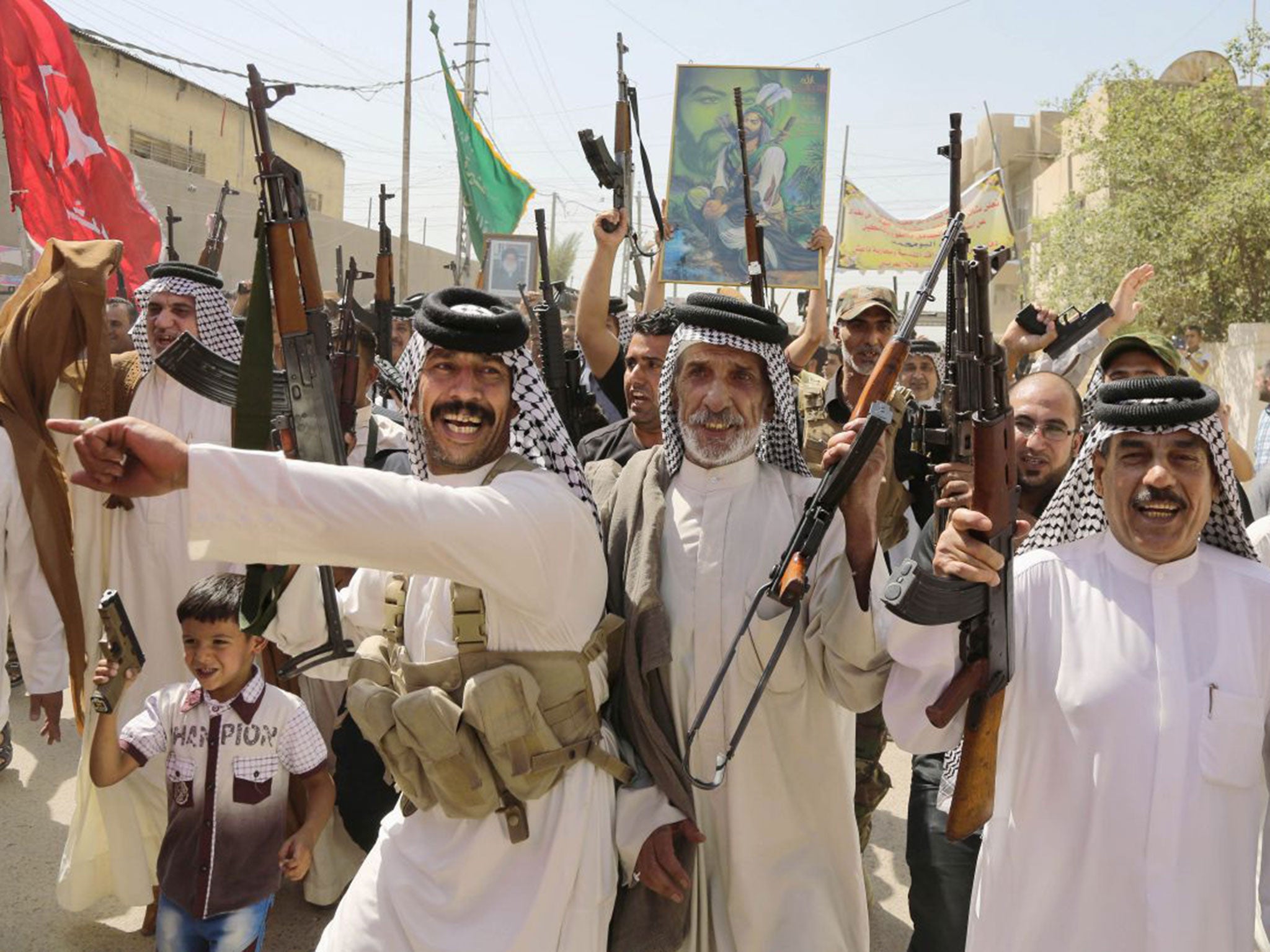Iraq crisis: Sunni advance on Baghdad stalled by Shia forces
Iran pledges its support for its neighbour as thousands of volunteers heed the call to arms

The Iraqi army launched its counter-attack yesterday against the Islamic State of Iraq and the Levant (Isis) forces whose lightning advance not only seized large sections of the country but also threatened the capital itself, Baghdad.
Supported by volunteers who heeded the call by Iraq's leading Shia clerics to take up weapons to face the advancing Sunni fighters, as well as reportedly advisers and troops from Iran, the country's military appeared to have stemmed the advance north of the city.
Iran pledged its support for the Iraqi Prime Minister, Nouri al-Maliki, with Tehran pledging "any assistance" for Baghdad "to confront terrorism" as the US ordered an aircraft carrier to the region.
Iraqi troops took Ishaqi, southeast of the city of Samarra, to secure the main highway leading north, while in nearby al-Mutasim soldiers forced Isis militiamen out into the desert. The town of Muqdadiyah, less than an hour from Baghdad, was also taken, this time with the support from the Shia Asaib Ahl al-Haq militia.
A military offensive was also claimed around Tikrit, though details remained sketchyyesterday. State-run television aired a constant flow of Iraqi nationalist songs, clips of soldiers singing and marching, flying aircraft and troops vowing to crash the militants. Warplanes also bombed a meeting of the banned Baath leadership in Diyala province, killing 50 people.
The successes were hailed in Baghdad as halting the Sunni Islamist offensive that had threatened to dismember Iraq and as evidence that its soldiers would fight after demoralised contingents had fled in the face of Isis advances.
"Our security forces have regained the initiative to launch qualitative operations on various fronts and have achieved remarkable victories with the help of volunteers," said Major-General Qassim al-Moussawi, the spokesman for the military's high command.
"We have regained the initiative and will not stop at liberating Mosul from terrorists," he continued, citing Iraq's second city, which was seized by Isis forces on Monday.
But scepticism remains over the Iraqi forces' ability to rally and stage alone a comprehensive strike-back, after its forces originally failed to confront the Isis attack. Thousands of young, predominantly Shia, Iraqis have flocked to form a civilian army, following Friday's call to arms by the representatives of Grand Ayatollah Ali al-Sistani, Iraq's most revered Shia spiritual leader. But they are largely untrained and ill equipped, with little military discipline.
In response, Tehran and Washington appeared on the brink last night of combining forces to stop the jihadist insurgency. Iran's President, Hassan Rouhani, confirmed that his forces were ready to assist the Iraqi government and did not rule out co-operation with the US. "We can think about it if we see America starts confronting the terrorist groups in Iraq or elsewhere," he said.
President Rouhani denied that Iranian soldiers were already in Iraq but there is evidence Iranian fighters – potentially as many as 2,000 – have entered the country.
In Washington, President Barack Obama has said the US will not send troops again into Iraq. But he has warned of US involvement, which could involve hardware and drone flights. Yesterday the Pentagon dispatched the USS George H W Bush aircraft carrier to the Gulf.
After seizing Mosul on Monday and sacking Saddam Hussein's home town of Tikrit, Sunni militants had entered Diyala province late last week. Yesterday, Isis forces continued to besiege the government forces in Baiji oil refinery, Iraq's largest, and its men were also reported to have fought in the small town of Udheim. The UN has warned of "summary executions and extrajudicial killings" during the militants' advance.
In London, the White House's continuing support for the beleaguered Iraqi Prime Minister was described as "deeply damaging" to the US and its allies. Sir Menzies Campbell, a member of the House of Commons Intelligence Select Committee, told The IoS: "The survival of the Maliki government must be in considerable doubt, and for the Americans, it would be deeply damaging if they were to support a government which may well be on the way out."
Colonel Richard Kemp, who served in Iraq in 2005, said: "The current dire situation in Iraq became inevitable when the leaders of Britain and the United States abandoned the country with indecent haste, their decisions dominated by electoral rather than strategic considerations."
Subscribe to Independent Premium to bookmark this article
Want to bookmark your favourite articles and stories to read or reference later? Start your Independent Premium subscription today.

Join our commenting forum
Join thought-provoking conversations, follow other Independent readers and see their replies